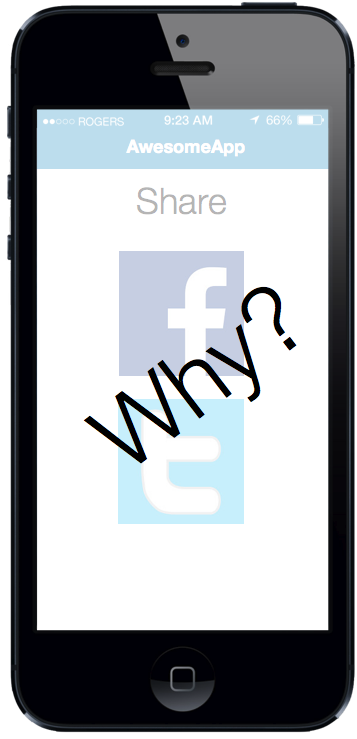It is becoming more common for apps to support sharing to social networks, be it Facebook, Twitter, Instagram, or Google+. The major smartphone platforms have been integrating these social networks deeper into the operating system. For example, Apple’s iOS platform has system-level support for Facebook and Twitter, providing an easy way for apps to share out to the social networks.
But why? Why should apps share out to social networks? If you’ve spent any time on these social networks, you know that the steady stream of app-based posts can get annoying pretty quickly (and no, I will not help you with FarmVille, so stop asking).
Though some apps may have overused social sharing, there are legitimate reasons why apps should support social sharing. When done well, social sharing can increase use of your app by allowing your users to express themselves through your content, as well as providing an avenue for their friends to learn about your app.
Your app is a social network
There is a large class of apps that form small social networks within the app. For example, the whole point of apps like Instagram, Happier, and GasBuddy are to create and post content to the app user groups (whether that be pictures, moments in your life that made you happy, or your local gas prices). In these apps, sharing is essential to the success of app, but this kind of sharing is typically done only within the app’s social network, not out to the larger social networks like Facebook or Twitter.
“Progress” as bragging rights
Turning from social network-like apps, when is social sharing an important feature that should be included, while not being annoying? One kind of app is where sharing could provide people a way to brag about some progress. This one is overused, and quickly becomes annoying. People are often really proud when they finally passed that level on Candy Crush, but sharing this every time to Facebook will quickly fill up your feed, and cause your friends to start to ignore you and the app. This is particularly bad, because any of their friends who might have otherwise downloaded your app out of interest are now completely turned off by your app.
There is one kind of bragging rights that is more appropriate. Apps where social pressure or encouragement are useful, such as charity donation apps or fitness trackers, make better use of social sharing, though they should be infrequent and only for large goals. For example, after meeting your goal weight, that would be a great milestone to “brag” about to social media. In addition, this is great advertising for your app, as people were able to use your app to meet their goals, encouraging their friends to try it out.
For rewards
Another good use of social sharing is through a rewards system, though again, it should be used sparingly. For example, apps where sharing a product review to the social networks may provide bonus “points” you can use to purchase more products. This can be easily overused though, such as in Candy Crush, where you can ask your Facebook friends to help you skip a level.
Tell others about your app
Probably the best use of sharing to social media from apps is the “tell others about this app” feature. If you have a really great app, people will spread the word through word of mouth with their friends. People will probably just talk about it, and may not use a “share” feature from your app for this use, but if even a very small percentage of your users do, this is essentially free marketing for your app. This kind of sharing is not difficult to build, so the cost is likely worth it even if it is only used a couple times. Why not make it as easy as possible for your users to market your app for free?
Conclusion
Previous apps have often overdone sharing to social media, but there are legitimate uses of social sharing that can increase your app usage. When done correctly, social sharing increases your app’s reach by being publicly shared, and can increase people’s positive feelings towards your app when people see their friends successfully meeting goals through the use of your app.


